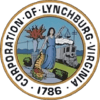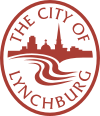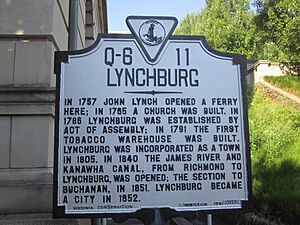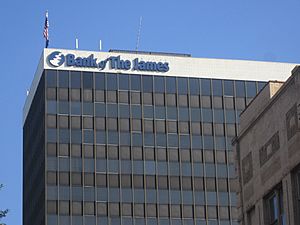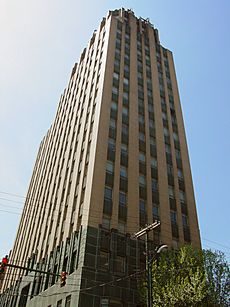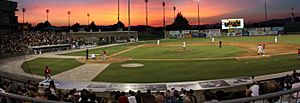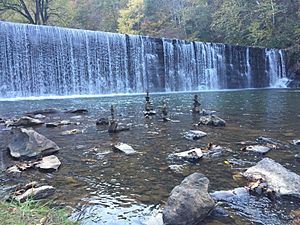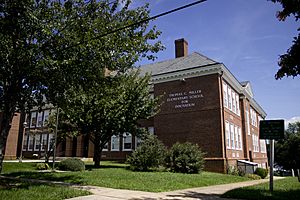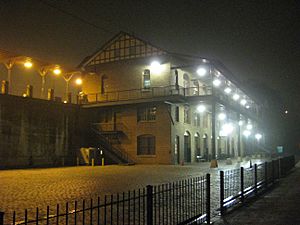Lynchburg, Virginia facts for kids
Quick facts for kids
Lynchburg, Virginia
|
|||
|---|---|---|---|
| City of Lynchburg | |||
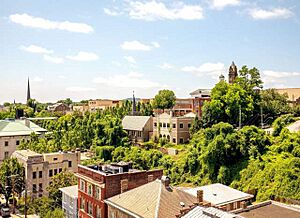
Downtown Lynchburg
|
|||
|
|||
| Nickname(s):
City of Seven Hills, The Hill City
|
|||
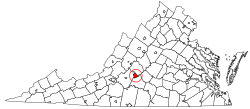
Location in Virginia
|
|||
| Country | United States | ||
| State | Virginia | ||
| Founded | 1786 | ||
| Incorporated (town) | 1805 | ||
| Incorporated (city) | 1852 | ||
| Named for | John Lynch | ||
| Government | |||
| • Type | Council–Manager | ||
| Area | |||
| • Independent city | 49.53 sq mi (128.27 km2) | ||
| • Land | 48.97 sq mi (126.84 km2) | ||
| • Water | 0.55 sq mi (1.43 km2) | ||
| Elevation | 630 ft (192 m) | ||
| Population
(2020)
|
|||
| • Independent city | 79,009 | ||
| • Estimate
(2023)
|
79,535 | ||
| • Rank | 11th in Virginia | ||
| • Density | 1,595.17/sq mi (615.959/km2) | ||
| • Urban | 125,596 (US: 268th) | ||
| • Metro | 261,593 (US: 190th) | ||
| • Demonym | Lynchburger | ||
| Time zone | UTC−5 (EST) | ||
| • Summer (DST) | UTC−4 (EDT) | ||
| ZIP code(s) |
24501, 24502, 24503, 24504, 24505, 24551
|
||
| Area code(s) | 434 | ||
| FIPS code | 51-680 | ||
| GNIS feature ID | 1479007 | ||
Lynchburg is a city in Virginia, United States. It's called an independent city because it's not part of any county. The city was first settled in 1757 by John Lynch, who ran a ferry.
In 2020, about 79,009 people lived here. This makes Lynchburg the 11th largest city in Virginia. It's located near the Blue Ridge Mountains and the James River. Lynchburg is also known as the "City of Seven Hills" or the "Hill City." During the American Civil War, it was the only city in Virginia that the Union army didn't take over before the war ended.
Lynchburg is the center of a larger area called the Lynchburg metropolitan area. This area has about 261,593 people. Many colleges and universities are located here, including Virginia University of Lynchburg, Randolph College, University of Lynchburg, Central Virginia Community College, and Liberty University.
Contents
A Look Back in Time: Lynchburg's History
Long ago, Monacan people and other tribes lived in this area. They were here well before English settlers arrived. Explorers visited their villages in the late 1600s. These tribes lived here until around 1702.
How Lynchburg Started and Grew
Lynchburg was founded in 1757 and named after John Lynch (1740-1820). When he was about 17, John Lynch started a ferry service. This ferry helped people cross the James River to reach nearby New London. The settlement quickly grew around Lynch's Ferry.
In 1786, Virginia officially recognized Lynchburg as a settlement. The James River Company was formed to improve river travel. This made it easier to transport goods like tobacco to Richmond and the Atlantic Ocean. Lynchburg became a busy center for trade and business.
The General Assembly made Lynchburg a town in 1805 and a city in 1852. John Lynch built the first bridge across the James River in 1812. This bridge replaced his ferry. By 1810, Thomas Jefferson, who had a home nearby, called Lynchburg "the most rising place in the U.S."
Early Lynchburg didn't have many churches. But in 1805, Methodists built the first church. The James River and Kanawha Canal reached Lynchburg in 1840. By then, over 6,000 people lived in the city. Even though floods damaged the canal, new railroads began to connect Lynchburg to other cities.
By the 1850s, Lynchburg was one of the richest towns in the U.S. for its size. Its economy was strong because of tobacco, trade, and iron. Railroads became very important. By the time of the Civil War, several railroads connected Lynchburg to places like Richmond and Washington.
Lynchburg During the Civil War
During the American Civil War, Lynchburg was a key place for the Confederate side. It was a major transportation hub and supply center. The city also had 30 hospitals for soldiers.
In June 1864, Union forces led by General David Hunter came close to Lynchburg. Confederate troops fought them off. The city's defenders quickly built walls to protect it. General Jubal Early and his Confederate forces arrived just in time.
On June 18, 1864, the Battle of Lynchburg took place. Even though the Confederate forces were outnumbered, they pushed back the Union troops. The city's defenders tricked the Union army into thinking they had more soldiers. For example, they ran a train back and forth and cheered loudly. This made it seem like many more troops were arriving.
From April 6 to 10, 1865, Lynchburg became the capital of Virginia. The state government moved there as Richmond was about to fall. Soon after, General Robert E. Lee surrendered, ending the Civil War. Lynchburg surrendered on April 12.
After the War: Recovery and Growth
After the war, Lynchburg's railroads were damaged. But the city worked to rebuild. New public schools were built, offering education to more students. Floods in the 1870s destroyed bridges and the canal. However, new railroads were built, connecting Lynchburg even more. By the 1880s, Lynchburg had a telegraph, a streetcar system, and about 15,000 residents.
In the late 1800s, Lynchburg became a manufacturing hub. It was sometimes called the "Pittsburgh of the South." In 1880, James Albert Bonsack invented the first cigarette rolling machine here. The city's economy grew with new factories like the Lynchburg Cotton Mill and Craddock-Terry Shoe Co.
Many colleges were also founded around this time. Virginia University of Lynchburg was started in 1886. Randolph College and Sweet Briar College opened in the 1890s and early 1900s. University of Lynchburg began in 1903. The city's first public library, Jones Memorial Library, opened in 1907.
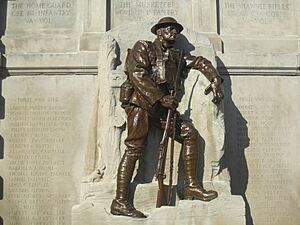
During World War I, Lynchburg's factories were very busy. The city continued to grow through the 1920s and survived the Great Depression. Its first radio station opened in 1930, and its airport in 1931.
Modern Lynchburg: Revitalization
Lynchburg's factories were busy again during World War II. In the 1950s, big companies like General Electric built factories here.
However, Lynchburg did not get a major interstate highway. This meant it was the largest city in Virginia without one at the time.
Since 1971, Liberty University was founded by local pastor Jerry Falwell. It is now the city's largest college.
Lynchburg has many historic areas. Since 2002, downtown Lynchburg has been greatly improved. Old warehouses and mills have been turned into new apartments. Many businesses have moved downtown. New projects include restoring the Virginian Hotel and the Academy Center of the Arts.
City Layout and Climate
Lynchburg covers about 49.6 square miles. Most of this is land, with a small amount of water.
Neighborhoods of Lynchburg
Lynchburg is famous for being built on seven hills. These are some of its first neighborhoods:
- Court House Hill
- College Hill
- Daniel's Hill
- Diamond Hill
- Federal Hill
- Franklin Hill
- Garland Hill
- White Rock Hill
Other important neighborhoods include Boonsboro, Rivermont, Fort Hill, and Wyndhurst.
Lynchburg's Weather
Lynchburg has a climate with four distinct seasons. Winters are cool, and summers are hot and humid. The average temperature in January is about 35.9°F (2.2°C). In July, it's about 76.0°F (24.4°C).
The city usually has about 27 days a year where the temperature reaches 90°F (32°C) or higher. Snowfall averages about 11.6 inches (29 cm) per winter. However, the amount of snow can change a lot each year.
The highest temperature ever recorded was 106°F (41°C) in July 1936. The lowest was -11°F (-24°C) in February 2015.
| Climate data for Lynchburg, Virginia (Lynchburg Regional Airport), 1991–2020 normals, extremes 1893–present | |||||||||||||
|---|---|---|---|---|---|---|---|---|---|---|---|---|---|
| Month | Jan | Feb | Mar | Apr | May | Jun | Jul | Aug | Sep | Oct | Nov | Dec | Year |
| Record high °F (°C) | 80 (27) |
82 (28) |
92 (33) |
95 (35) |
100 (38) |
104 (40) |
106 (41) |
105 (41) |
102 (39) |
98 (37) |
84 (29) |
79 (26) |
106 (41) |
| Mean maximum °F (°C) | 67 (19) |
70 (21) |
79 (26) |
86 (30) |
89 (32) |
93 (34) |
95 (35) |
94 (34) |
90 (32) |
84 (29) |
75 (24) |
68 (20) |
96 (36) |
| Mean daily maximum °F (°C) | 46.0 (7.8) |
49.6 (9.8) |
58.2 (14.6) |
68.8 (20.4) |
75.9 (24.4) |
83.2 (28.4) |
86.9 (30.5) |
85.2 (29.6) |
78.9 (26.1) |
68.9 (20.5) |
58.2 (14.6) |
49.0 (9.4) |
67.4 (19.7) |
| Daily mean °F (°C) | 35.9 (2.2) |
38.8 (3.8) |
46.4 (8.0) |
56.1 (13.4) |
64.2 (17.9) |
72.0 (22.2) |
76.0 (24.4) |
74.5 (23.6) |
68.0 (20.0) |
57.0 (13.9) |
46.5 (8.1) |
38.9 (3.8) |
56.2 (13.4) |
| Mean daily minimum °F (°C) | 25.8 (−3.4) |
28.0 (−2.2) |
34.6 (1.4) |
43.5 (6.4) |
52.5 (11.4) |
60.7 (15.9) |
65.0 (18.3) |
63.8 (17.7) |
57.1 (13.9) |
45.1 (7.3) |
34.8 (1.6) |
28.9 (−1.7) |
45.0 (7.2) |
| Mean minimum °F (°C) | 7 (−14) |
12 (−11) |
18 (−8) |
29 (−2) |
38 (3) |
50 (10) |
56 (13) |
55 (13) |
43 (6) |
30 (−1) |
21 (−6) |
14 (−10) |
5 (−15) |
| Record low °F (°C) | −10 (−23) |
−11 (−24) |
5 (−15) |
20 (−7) |
30 (−1) |
40 (4) |
49 (9) |
45 (7) |
35 (2) |
21 (−6) |
8 (−13) |
−4 (−20) |
−11 (−24) |
| Average precipitation inches (mm) | 3.46 (88) |
2.91 (74) |
3.76 (96) |
3.45 (88) |
3.98 (101) |
3.82 (97) |
4.19 (106) |
3.22 (82) |
3.96 (101) |
3.12 (79) |
3.39 (86) |
3.50 (89) |
42.76 (1,086) |
| Average snowfall inches (cm) | 3.5 (8.9) |
3.6 (9.1) |
2.4 (6.1) |
0.1 (0.25) |
0.0 (0.0) |
0.0 (0.0) |
0.0 (0.0) |
0.0 (0.0) |
0.0 (0.0) |
0.0 (0.0) |
0.0 (0.0) |
2.0 (5.1) |
11.6 (29) |
| Average precipitation days (≥ 0.01 in) | 9.9 | 9.5 | 11.1 | 10.2 | 12.1 | 10.9 | 11.8 | 9.7 | 8.5 | 7.7 | 8.1 | 9.4 | 118.9 |
| Average snowy days (≥ 0.1 in) | 1.7 | 1.8 | 1.2 | 0.1 | 0.0 | 0.0 | 0.0 | 0.0 | 0.0 | 0.0 | 0.0 | 0.9 | 5.7 |
| Mean monthly sunshine hours | 167.0 | 168.2 | 221.7 | 243.7 | 272.3 | 287.5 | 273.4 | 256.6 | 226.5 | 215.4 | 169.6 | 155.9 | 2,657.8 |
| Percent possible sunshine | 54 | 56 | 60 | 62 | 62 | 65 | 61 | 61 | 61 | 62 | 55 | 52 | 60 |
| Source: NOAA (sun 1961–1990) | |||||||||||||
The Seven Hills of Lynchburg
Lynchburg is often called the "City of Seven Hills." This is because of the seven main hills that shape its landscape:
- College Hill
- Garland Hill
- Daniel's Hill
- Federal Hill
- Diamond Hill
- White Rock Hill
- Franklin Hill
Neighboring Areas
Lynchburg is next to these counties:
- Amherst County, Virginia (to the northeast)
- Bedford County, Virginia (to the west and northwest)
- Campbell County, Virginia (to the south and southeast)
People and Population
| Historical population | |||
|---|---|---|---|
| Census | Pop. | %± | |
| 1830 | 4,630 | — | |
| 1840 | 6,395 | 38.1% | |
| 1850 | 8,071 | 26.2% | |
| 1860 | 6,853 | −15.1% | |
| 1870 | 6,825 | −0.4% | |
| 1880 | 15,959 | 133.8% | |
| 1890 | 19,709 | 23.5% | |
| 1900 | 18,891 | −4.2% | |
| 1910 | 29,494 | 56.1% | |
| 1920 | 30,070 | 2.0% | |
| 1930 | 40,661 | 35.2% | |
| 1940 | 44,541 | 9.5% | |
| 1950 | 47,727 | 7.2% | |
| 1960 | 54,790 | 14.8% | |
| 1970 | 54,083 | −1.3% | |
| 1980 | 66,743 | 23.4% | |
| 1990 | 66,049 | −1.0% | |
| 2000 | 65,269 | −1.2% | |
| 2010 | 75,568 | 15.8% | |
| 2020 | 79,009 | 4.6% | |
| U.S. Decennial Census 1790–1960 1900–1990 1990–2000 2010 2020 |
|||
Population in 2020
In 2020, Lynchburg had 79,009 people. Here's a quick look at the population breakdown:
| Race / Ethnicity | Pop 2010 | Pop 2020 | % 2010 | % 2020 |
|---|---|---|---|---|
| White alone (NH) | 47,574 | 47,654 | 62.96% | 60.31% |
| Black or African American alone (NH) | 21,984 | 21,228 | 29.09% | 26.87% |
| Native American or Alaska Native alone (NH) | 200 | 200 | 0.26% | 0.25% |
| Asian alone (NH) | 1,852 | 1,752 | 2.45% | 2.22% |
| Pacific Islander alone (NH) | 27 | 34 | 0.04% | 0.04% |
| Some Other Race alone (NH) | 184 | 669 | 0.24% | 0.85% |
| Mixed Race/Multi-Racial (NH) | 1,447 | 3,592 | 1.91% | 4.55% |
| Hispanic or Latino (any race) | 2,300 | 3,880 | 3.04% | 4.91% |
| Total | 75,568 | 79,009 | 100.00% | 100.00% |
Note: The US Census counts Hispanic/Latino people as an ethnic group. This table separates them from racial categories.
Population in 2010
In 2010, Lynchburg had 75,568 people.
- About 63.0% were White.
- About 29.3% were African American.
- About 2.5% were Asian.
- About 3.0% were Hispanic or Latino.
The median age was 35 years old. The average household income was $32,234.
Economy and Jobs
Forbes Magazine ranked Lynchburg as one of the best places for business in Virginia in 2006. This shows that the city has a strong economy.
Lynchburg's main industries include:
- Nuclear technology
- Medicine (pharmaceuticals)
- Material handling (moving and storing goods)
Many different small businesses in the area help keep the economy stable. This means the city is less affected by big economic changes.
Arts and Fun Activities
Lynchburg offers many cultural and fun things to do:
- Lynchburg Symphony Orchestra: Enjoy classical, patriotic, and popular music.
- Academy of Fine Arts: A central place for arts, culture, and community events.
- Renaissance Theater: The oldest community theater in the area, running for over 25 years.
- Lynchburg Art Club: Started in 1895, it's a place for local artists.
- Opera on the James: See operas performed by talented artists.
- The Maier Museum of Art: Located at Randolph College, it features American art.
- Riverviews Artspace: A place for modern art shows and various programs.
- Wolfbane Productions: An award-winning group that puts on plays and cultural events.
Here are some popular attractions in the Lynchburg area:
- Amazement Square: A hands-on children's museum.
- Appomattox Courthouse: The historic site where the Civil War ended in 1865.
- Crabtree Falls: The tallest waterfall east of the Mississippi River. Be careful on the trails!
- James River Heritage Trail: A path for walking and biking along the river.
- Miller-Claytor House: A historic house where Thomas Jefferson supposedly ate a tomato to show it wasn't poisonous.
- National D-Day Memorial: Located in Bedford, it honors those who served in the D-Day invasion of World War II.
- Old City Cemetery Museums & Arboretum: A historic cemetery and garden with many old roses.
- The Old Court House: A landmark building from 1855, now a museum of local history.
- Peaks of Otter: Three beautiful mountain peaks in the Blue Ridge Mountains.
- Point of Honor: A historic mansion once owned by Dr. George Cabell Sr..
- Poplar Forest: Thomas Jefferson's private retreat home.
- Smith Mountain Lake: The largest lake entirely in Virginia, great for water activities.
Sports and Recreation
Lynchburg has many sports and outdoor activities:
- Blackwater Rugby Club: A local rugby team.
- Hiking Areas: Enjoy trails at the Appalachian Trail, Peaks of Otter, Blackwater Creek Natural Area, and Liberty Mountain Trail System.
- Liberty Flames: The sports teams of Liberty University, playing in NCAA Division I.
- University of Lynchburg: The Hornets are an NCAA Division III school.
- Lynchburg Hillcats: A professional baseball team affiliated with the Cleveland Guardians.
- Liberty Mountain SnowFlex Centre: A special synthetic slope for year-round skiing, snowboarding, and tubing. It's the first of its kind in the U.S.
Education and Learning
Colleges and Universities
Lynchburg is home to several colleges:
- Central Virginia Community College (public)
- Liberty University and Liberty University Online Academy (LUOA) (private)
- University of Lynchburg (private)
- Randolph College (private)
- Virginia University of Lynchburg (private)
- Sweet Briar College (private, located nearby)
Schools for Kids
Lynchburg City Public Schools serve the city's students.
- High Schools:
- E. C. Glass High School
- Heritage High School
- Middle Schools:
- Linkhorne Middle School
- Paul Laurence Dunbar Middle School
- Sandusky Middle School
- Elementary Schools:
- William Marvin Bass Elementary School
- Bedford Hills Elementary School
- Dearington Elementary School for Innovation
- Heritage Elementary School
- Linkhorne Elementary School
- Paul M. Munro Elementary School
- Perrymont Elementary School
- Robert S. Payne Elementary School
- Sandusky Elementary School
- Sheffield Elementary School
- Thomas C. Miller Elementary School for Innovation
Lynchburg also has the Central Virginia Governor's School for Science and Technology. This special school focuses on math and science for older students.
There are also many private schools in the city, including:
- Appomattox Christian Academy
- Desmond T Doss Christian Academy
- James River Day School
- Liberty Christian Academy
- New Covenant Classical Christian School
- Timberlake Christian Academy
- Virginia Episcopal School
- New Vistas School
Media and News
Lynchburg shares its television and radio market with Roanoke.
Newspapers and Magazines
- The News & Advance: Lynchburg's daily newspaper.
- Lynchburg Living: A magazine published every two months.
- The Burg: A weekly newspaper about entertainment.
- Lynch's Ferry: A journal about local history.
- Liberty Champion: Liberty University's student newspaper.
TV Stations
- WSET-TV: ABC channel.
- WSLS-TV: NBC channel.
- WDBJ: CBS channel.
- WBRA-TV: PBS channel.
- WFXR: Fox channel.
- WWCW: CW channel.
- WPXR-TV: ION channel.
- WZBJ: MyNetworkTV channel.
Radio Stations
Lynchburg has many radio stations playing different types of music and talk shows. Some examples include:
- WJJX 102.7 (Urban Contemporary)
- WLNI 105.9 (Talk Radio)
- WKHF 93.7 (Hot AC)
- WRVL 88.3 (Christian Radio)
- WYYD 107.9 (Country)
Getting Around Lynchburg
Local Transportation
The Greater Lynchburg Transit Company (GLTC) runs the local public transport bus service in the city. They also provide shuttle buses for Liberty University.
The GLTC built a new bus transfer center near the Kemper Street Station. This helps people easily switch between buses and trains.
Travel Between Cities
You can find intercity train and bus services at Kemper Street Station. This historic station was recently updated.
Bus Travel
Greyhound Lines has its bus terminal at Kemper Street Station. You can take a Greyhound bus to other cities in Virginia, the U.S., Canada, and Mexico.
Train Travel
Amtrak trains connect Lynchburg to many major cities. You can travel to places like Boston, New York, Washington, D.C., Charlotte, and New Orleans.
In 2009, a new Amtrak train service started from Lynchburg. It became very popular, carrying many more passengers than expected.
Lynchburg also has two major freight railroads: Norfolk Southern and CSX Transportation.
Air Travel
Lynchburg Regional Airport offers flights to Charlotte, North Carolina, through American Eagle. This is the only airline with regular flights from Lynchburg. Air travel from the airport has increased a lot in recent years.
Highways
Major roads in Lynchburg include U.S. Route 29, U.S. Route 501, U.S. Route 221, and U.S. Highway 460. Even though Lynchburg doesn't have an interstate highway, these roads have been improved.
Famous People from Lynchburg
Many notable people have connections to Lynchburg:
- Daniel Weisiger Adams (1820–1872), a lawyer and Confederate Army officer.
- Beth Behrs (born 1985), an actress.
- James Albert Bonsack (1859–1924), invented the first cigarette-rolling machine.
- Connie Britton (born 1967), an actress.
- Desmond Doss (1919–2006), a World War II hero who received the Medal of Honor. His story is in the movie Hacksaw Ridge.
- Jubal Early (1816–1894), a lawyer and Confederate general.
- Jerry Falwell (1933–2007), a pastor and founder of Moral Majority.
- Charles Browne Fleet (1843–1916), a pharmacist and inventor.
- Daniel Hudson (born 1987), a baseball player for the Los Angeles Dodgers.
- Brandon Inge (born 1977), a former baseball player for the Detroit Tigers.
- Leland D. Melvin (born 1964), an engineer and NASA astronaut.
- Skeet Ulrich (born 1970), an actor known for Scream and Riverdale.
- Phil Vassar (born 1964), a country music singer.
- Charles Vess (born 1951), a fantasy and comics artist.
Sister Cities
Lynchburg has sister cities in other countries:
 Glauchau, Germany
Glauchau, Germany Rueil-Malmaison, France
Rueil-Malmaison, France
Images for kids
See also
 In Spanish: Lynchburg (Virginia) para niños
In Spanish: Lynchburg (Virginia) para niños
 | Frances Mary Albrier |
 | Whitney Young |
 | Muhammad Ali |


